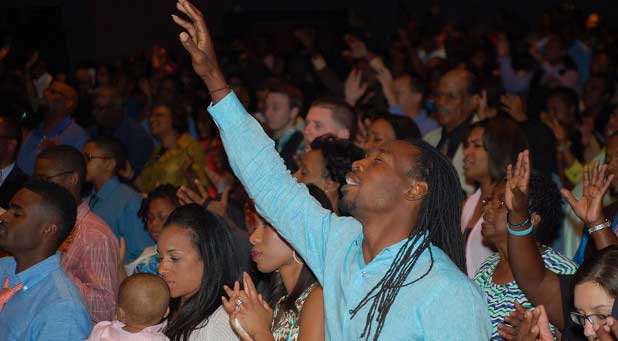If you happen to tune into the Oxygen network’s Preachers of L.A. or National Geographic Channel’s Snake Salvation, you might be tempted to believe all Pentecostals are either money-grubbing charlatans or misguided rural bumpkins. But the truth is never in the media stereotypes.
I’m a Pentecostal. I don’t wear that label on my sleeve, but I’m not ashamed to admit to anyone that I’m a Christian who believes in the power of the Holy Spirit. Yet when I use the word Pentecostal to describe myself I get some funny looks.
Some people think Pentecostals are brainless weirdos who go into uncontrollable fits during religious services. They’re surprised to learn we have advanced degrees, own businesses, hold public office and mobilize a lot of the world’s charitable work.
To set the record straight, here are 10 facts about Pentecostals that might clear up the misconceptions:
1. We do not necessarily attend Pentecostal churches. Since the 1960s in the United States, there have been growing numbers of Pentecostals in other denominational churches. There are Pentecostal Anglicans, Pentecostal Methodists, Pentecostal Baptists and huge numbers of Pentecostal Catholics. A recent 2011 Pew Research Center study revealed that Pentecostals and charismatics make up more than a quarter of all Christians today. And last year the leader of all Anglicans, the Archbishop of Canterbury, Justin Welby, admitted that he speaks in tongues.
2. We are not uneducated. The idea that Pentecostals are theologically ignorant is silly when you consider that 300 of the world’s most well-known Pentecostal scholars gathered in March of this year to present papers. The theologians who participated in the annual meeting of the Society for Pentecostal Studies in Springfield, Missouri, represented more than 100 denominations and 200 academic institutions.
3. We do not all live on the “other side of the tracks.” When the Pentecostal revival began in 1906 in Los Angeles, proponents of our movement were characterized as poor people who worshiped in tents with sawdust floors. But today a huge percentage of American Pentecostals belong to the middle class, and in developing countries wealthy Pentecostals are funding ambitious missionary projects. Meanwhile the owner of Hobby Lobby, David Green—who has been in the news this week because the Supreme Court ruled in his company’s favor—is a Pentecostal who is worth about $5 billion.
4. We do not all support the prosperity gospel. While flamboyant preachers like Clarence McClendon and Noel Jones flaunt their wealth while begging for dollars on Preachers of L.A., the prosperity gospel is not a hit among a majority of Pentecostals. In fact, one of the nation’s most prominent Pentecostal preachers, T.D. Jakes of Dallas, rebuked the stars of the reality show and told his congregation to “pull the plug” on it.
5. We do not handle snakes. Americans became intrigued with the oddity of religious snake handling because of National Geographic Channel’s Snake Salvation show. But remember that there are only about 125 churches in this country that belong to this strange sect, and the congregations are tiny. Remember, too, that prominent snake-handling pastor Jamie Coots of Middlesboro, Kentucky, died this year from a snake bite. Pentecostal denominations have condemned snake-handling since the practice began around 1910.
6. We do not go into a trance when we speak in tongues. People who speak in tongues pray voluntarily, and they can start and stop their prayers whenever they want. When researchers from the University of Pennsylvania studied the phenomenon of speaking in tongues, they found that it actually produced a feeling of peace and well-being in people who engaged in the behavior. And The New York Times reported in 2006 that a study of Christians in England suggested that those who spoke in tongues “were more emotionally stable than those who did not.”
7. We are not all Republicans. Yes, Sarah Palin has attended a Pentecostal church, and so has former Attorney General John Ashcroft. But it is rudely stereotypical to assume that all Pentecostals are white conservatives. A large percentage of American Pentecostals are African-American and Hispanic, and many of them voted for Barack Obama in the divisive 2008 election. Studies have shown that Pentecostals and evangelical Christians are the largest voting bloc in the nation, and that Obama could not have won without sizeable support from this group.
8. We are not racists. While it is certainly true that racism tainted the early years of Pentecostalism, today Pentecostal and charismatic churches are more likely to be racially mixed than other denominational groups. This is primarily because the essence of the Pentecostal experience, as described in the Book of Acts, involves the breaking down of racial and cultural walls by the power of the Holy Spirit.
9. We are not prudes. There was a day when Pentecostals (along with Baptists and holiness groups) preached hard against secular entertainment—and anything else that sounded fun. Women couldn’t wear pants or makeup, men couldn’t play cards, and movies were off limits. But this doesn’t describe Pentecostals today. We have invaded the arts. And some, like David Cunningham, son of Youth With a Mission founder Loren Cunningham, have become professional filmmakers.
10. We are not going away. Pentecostals only represented 6 percent of all Christians in the year 1980. Today that number has jumped to 26 percent. And the Pulitzer Center reports that 35,000 people join Pentecostal churches every day. Some researchers predict there will be 1 billion Pentecostals in the world by 2025. No matter how you stereotype us, it cannot be said that Pentecostals are on the fringes of society. You might as well get to know us.
J. Lee Grady is the former editor of Charisma. You can follow him on Twitter at leegrady. He is the author of The Holy Spirit Is Not for Sale and other books.












